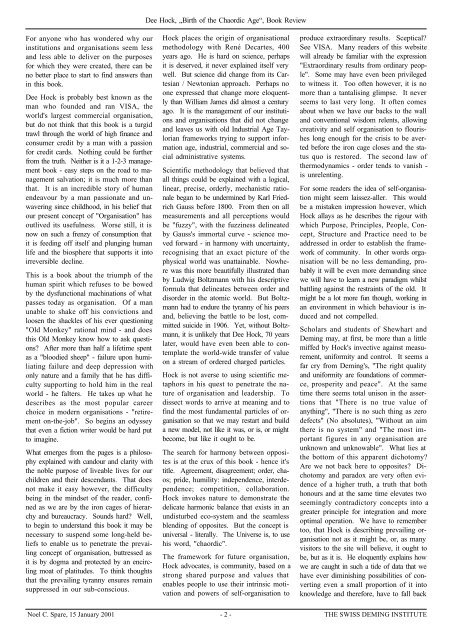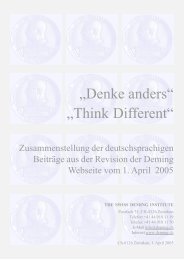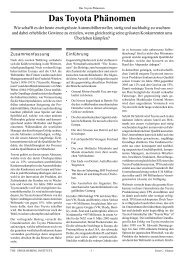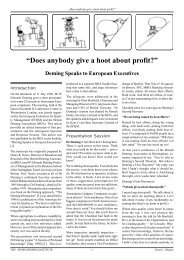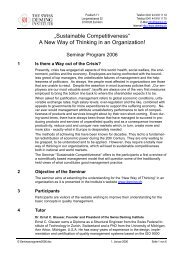Birth of the Chaordic Age*) Book Review - Swiss Deming Institute
Birth of the Chaordic Age*) Book Review - Swiss Deming Institute
Birth of the Chaordic Age*) Book Review - Swiss Deming Institute
You also want an ePaper? Increase the reach of your titles
YUMPU automatically turns print PDFs into web optimized ePapers that Google loves.
For anyone who has wondered why our<br />
institutions and organisations seem less<br />
and less able to deliver on <strong>the</strong> purposes<br />
for which <strong>the</strong>y were created, <strong>the</strong>re can be<br />
no better place to start to find answers than<br />
in this book.<br />
Dee Hock is probably best known as <strong>the</strong><br />
man who founded and ran VISA, <strong>the</strong><br />
world's largest commercial organisation,<br />
but do not think that this book is a turgid<br />
trawl through <strong>the</strong> world <strong>of</strong> high finance and<br />
consumer credit by a man with a passion<br />
for credit cards. Nothing could be fur<strong>the</strong>r<br />
from <strong>the</strong> truth. Nei<strong>the</strong>r is it a 1-2-3 management<br />
book - easy steps on <strong>the</strong> road to management<br />
salvation; it is much more than<br />
that. It is an incredible story <strong>of</strong> human<br />
endeavour by a man passionate and unwavering<br />
since childhood, in his belief that<br />
our present concept <strong>of</strong> "Organisation" has<br />
outlived its usefulness. Worse still, it is<br />
now on such a frenzy <strong>of</strong> consumption that<br />
it is feeding <strong>of</strong>f itself and plunging human<br />
life and <strong>the</strong> biosphere that supports it into<br />
irreversible decline.<br />
This is a book about <strong>the</strong> triumph <strong>of</strong> <strong>the</strong><br />
human spirit which refuses to be bowed<br />
by <strong>the</strong> dysfunctional machinations <strong>of</strong> what<br />
passes today as organisation. Of a man<br />
unable to shake <strong>of</strong>f his convictions and<br />
loosen <strong>the</strong> shackles <strong>of</strong> his ever questioning<br />
"Old Monkey" rational mind - and does<br />
this Old Monkey know how to ask questions?<br />
After more than half a lifetime spent<br />
as a "bloodied sheep" - failure upon humiliating<br />
failure and deep depression with<br />
only nature and a family that he has difficulty<br />
supporting to hold him in <strong>the</strong> real<br />
world - he falters. He takes up what he<br />
describes as <strong>the</strong> most popular career<br />
choice in modern organisations - "retirement<br />
on-<strong>the</strong>-job". So begins an odyssey<br />
that even a fiction writer would be hard put<br />
to imagine.<br />
What emerges from <strong>the</strong> pages is a philosophy<br />
explained with candour and clarity with<br />
<strong>the</strong> noble purpose <strong>of</strong> liveable lives for our<br />
children and <strong>the</strong>ir descendants. That does<br />
not make it easy however, <strong>the</strong> difficulty<br />
being in <strong>the</strong> mindset <strong>of</strong> <strong>the</strong> reader, confined<br />
as we are by <strong>the</strong> iron cages <strong>of</strong> hierarchy<br />
and bureaucracy. Sounds hard? Well,<br />
to begin to understand this book it may be<br />
necessary to suspend some long-held beliefs<br />
to enable us to penetrate <strong>the</strong> prevailing<br />
concept <strong>of</strong> organisation, buttressed as<br />
it is by dogma and protected by an encircling<br />
moat <strong>of</strong> platitudes. To think thoughts<br />
that <strong>the</strong> prevailing tyranny ensures remain<br />
suppressed in our sub-conscious.<br />
Dee Hock, „<strong>Birth</strong> <strong>of</strong> <strong>the</strong> <strong>Chaordic</strong> Age“, <strong>Book</strong> <strong>Review</strong><br />
Hock places <strong>the</strong> origin <strong>of</strong> organisational<br />
methodology with René Decartes, 400<br />
years ago. He is hard on science, perhaps<br />
it is deserved, it never explained itself very<br />
well. But science did change from its Cartesian<br />
/ Newtonian approach. Perhaps no<br />
one expressed that change more eloquently<br />
than William James did almost a century<br />
ago. It is <strong>the</strong> management <strong>of</strong> our institutions<br />
and organisations that did not change<br />
and leaves us with old Industrial Age Taylorian<br />
frameworks trying to support information<br />
age, industrial, commercial and social<br />
administrative systems.<br />
Scientific methodology that believed that<br />
all things could be explained with a logical,<br />
linear, precise, orderly, mechanistic rationale<br />
began to be undermined by Karl Friedrich<br />
Gauss before 1800. From <strong>the</strong>n on all<br />
measurements and all perceptions would<br />
be "fuzzy", with <strong>the</strong> fuzziness delineated<br />
by Gauss's immortal curve - science moved<br />
forward - in harmony with uncertainty,<br />
recognising that an exact picture <strong>of</strong> <strong>the</strong><br />
physical world was unattainable. Nowhere<br />
was this more beautifully illustrated than<br />
by Ludwig Boltzmann with his descriptive<br />
formula that delineates between order and<br />
disorder in <strong>the</strong> atomic world. But Boltzmann<br />
had to endure <strong>the</strong> tyranny <strong>of</strong> his peers<br />
and, believing <strong>the</strong> battle to be lost, committed<br />
suicide in 1906. Yet, without Boltzmann,<br />
it is unlikely that Dee Hock, 70 years<br />
later, would have even been able to contemplate<br />
<strong>the</strong> world-wide transfer <strong>of</strong> value<br />
on a stream <strong>of</strong> ordered charged particles.<br />
Hock is not averse to using scientific metaphors<br />
in his quest to penetrate <strong>the</strong> nature<br />
<strong>of</strong> organisation and leadership. To<br />
dissect words to arrive at meaning and to<br />
find <strong>the</strong> most fundamental particles <strong>of</strong> organisation<br />
so that we may restart and build<br />
a new model, not like it was, or is, or might<br />
become, but like it ought to be.<br />
The search for harmony between opposites<br />
is at <strong>the</strong> crux <strong>of</strong> this book - hence it's<br />
title. Agreement, disagreement; order, chaos;<br />
pride, humility: independence, interdependence;<br />
competition, collaboration.<br />
Hock invokes nature to demonstrate <strong>the</strong><br />
delicate harmonic balance that exists in an<br />
undisturbed eco-system and <strong>the</strong> seamless<br />
blending <strong>of</strong> opposites. But <strong>the</strong> concept is<br />
universal - literally. The Universe is, to use<br />
his word, "chaordic".<br />
The framework for future organisation,<br />
Hock advocates, is community, based on a<br />
strong shared purpose and values that<br />
enables people to use <strong>the</strong>ir intrinsic motivation<br />
and powers <strong>of</strong> self-organisation to<br />
produce extraordinary results. Sceptical?<br />
See VISA. Many readers <strong>of</strong> this website<br />
will already be familiar with <strong>the</strong> expression<br />
"Extraordinary results from ordinary people".<br />
Some may have even been privileged<br />
to witness it. Too <strong>of</strong>ten however, it is no<br />
more than a tantalising glimpse. It never<br />
seems to last very long. It <strong>of</strong>ten comes<br />
about when we have our backs to <strong>the</strong> wall<br />
and conventional wisdom relents, allowing<br />
creativity and self organisation to flourishes<br />
long enough for <strong>the</strong> crisis to be averted<br />
before <strong>the</strong> iron cage closes and <strong>the</strong> status<br />
quo is restored. The second law <strong>of</strong><br />
<strong>the</strong>rmodynamics - order tends to vanish -<br />
is unrelenting.<br />
For some readers <strong>the</strong> idea <strong>of</strong> self-organisation<br />
might seem laissez-aller. This would<br />
be a mistaken impression however, which<br />
Hock allays as he describes <strong>the</strong> rigour with<br />
which Purpose, Principles, People, Concept,<br />
Structure and Practice need to be<br />
addressed in order to establish <strong>the</strong> framework<br />
<strong>of</strong> community. In o<strong>the</strong>r words organisation<br />
will be no less demanding, probably<br />
it will be even more demanding since<br />
we will have to learn a new paradigm whilst<br />
battling against <strong>the</strong> restraints <strong>of</strong> <strong>the</strong> old. It<br />
might be a lot more fun though, working in<br />
an environment in which behaviour is induced<br />
and not compelled.<br />
Scholars and students <strong>of</strong> Shewhart and<br />
<strong>Deming</strong> may, at first, be more than a little<br />
miffed by Hock's invective against measurement,<br />
uniformity and control. It seems a<br />
far cry from <strong>Deming</strong>'s, "The right quality<br />
and uniformity are foundations <strong>of</strong> commerce,<br />
prosperity and peace". At <strong>the</strong> same<br />
time <strong>the</strong>re seems total unison in <strong>the</strong> assertions<br />
that "There is no true value <strong>of</strong><br />
anything", "There is no such thing as zero<br />
defects" (No absolutes), "Without an aim<br />
<strong>the</strong>re is no system" and "The most important<br />
figures in any organisation are<br />
unknown and unknowable". What lies at<br />
<strong>the</strong> bottom <strong>of</strong> this apparent dichotomy?<br />
Are we not back here to opposites? Dichotomy<br />
and paradox are very <strong>of</strong>ten evidence<br />
<strong>of</strong> a higher truth, a truth that both<br />
honours and at <strong>the</strong> same time elevates two<br />
seemingly contradictory concepts into a<br />
greater principle for integration and more<br />
optimal operation. We have to remember<br />
too, that Hock is describing prevailing organisation<br />
not as it might be, or, as many<br />
visitors to <strong>the</strong> site will believe, it ought to<br />
be, but as it is. He eloquently explains how<br />
we are caught in such a tide <strong>of</strong> data that we<br />
have ever diminishing possibilities <strong>of</strong> converting<br />
even a small proportion <strong>of</strong> it into<br />
knowledge and <strong>the</strong>refore, have to fall back<br />
Noel C. Spare, 15 January 2001 - 2 -<br />
THE SWISS DEMING INSTITUTE


